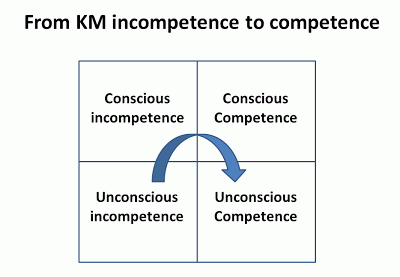Ten PowerPoint Slides on Knowledge Management that Have Influenced Me (Part 2)
To get to Part 1 of this blog post, click here.
Do you hate PowerPoint presentations? Well, you probably have endured a lot of gruesome slides throughout the course of your professional life. But despite the usual wisdom that PowerPoint slides for presentations should be avoided whenever possible, I actually think that some well-crafted slides presented in the right context can be a very good thing. In fact, there are a number of slides that had a very positive impact on me in my knowledge management career. I treasure them because they manage to bring complex concepts to the point and often communicate an entire lesson’s worth of insight just with one diagram, graph or image. Here’s a list of ten powerful slides on knowledge management that have influenced me, which I am posting in two parts (for Part 1 click here). See for yourself whether you can get some inspiration from them.
This is a quite a famous presentation that has been floating around since 2007 in different versions. It originated from a presentation that Karl Fisch gave to a group of education professionals, and since then has been revised and turned into a video (still based on PowerPoint slides) by Scott McLeod and the company XPLANE. Despite its somewhat sensational tone it serves as an excellent teaser to discuss the changes we are going through as a society and the implications this has for our learning. I usually use a few selected lines and numbers of the presentation when I do training on knowledge management, to set the stage for explaining why we need to deal with KM in the first place. The latest version of the presentation can be viewed as Youtube video here, and older versions are available in the ShiftHappens Wiki.
Do you hate PowerPoint presentations? Well, you probably have endured a lot of gruesome slides throughout the course of your professional life. But despite the usual wisdom that PowerPoint slides for presentations should be avoided whenever possible, I actually think that some well-crafted slides presented in the right context can be a very good thing. In fact, there are a number of slides that had a very positive impact on me in my knowledge management career. I treasure them because they manage to bring complex concepts to the point and often communicate an entire lesson’s worth of insight just with one diagram, graph or image. Here’s a list of ten powerful slides on knowledge management that have influenced me, which I am posting in two parts (for Part 1 click here). See for yourself whether you can get some inspiration from them.
6. The Innovation Adoption Curve
The innovation adoption curve
by sociology professor Everett
Rogers is a model that distinguishes
between different types of adopters of innovations, based on the idea that
certain individuals are more open to adaptation than others. Rogers innovation
adoption curve is useful to acknowledge that trying to quickly convince all
members of an organization of a new controversial idea is useless. Instead it
makes more sense to start with winning over innovators and early adopters
first. Also the categories and percentages can be used as a basis for setting
expectations with senior management and estimating target groups for
communication messages. Needless to say that when we introduced corporate
social networking in our organization, the adoption pattern looked exactly like
the above.
7. Managing Complex Change
This was part of a presentation given by Linda Stoddart
from Haute Ecole de Gestion in Geneva during
UNSSC’s Knowledge Management course “Think UN, Act Smart”. It’s like a light
bulb being switched on when you suddenly realize why you always felt in a
certain way when trying to promote KM in your organization, and what conditions
need to come together to make complex change happen.
8. Towards a Knowledge Age
Now this is the only slide among this selection that I have
created myself. For all its flaws (e.g. that it looks at history from a Western
perspective) it is particularly important to me because it illustrates the
massive challenge that we face with regards to managing the amount of knowledge
that humankind is producing. In addition, it also acknowledges the fact that
one of the main drivers underlying this monumental change towards a knowledge
society is technology. This is important, as in particular in the KM for
Development sphere there is often a dismissive view of technology as mere "tools” that should just follow user needs, while disregarding the fact that it
is often technology itself that is creating user needs in the first place and therefore
is triggering and reinforcing culture change.
9. RSS in Plain English
These slides are part of a PowerPoint adaption of the video
“RSS in Plain English”, and
I’m featuring them here as a tribute to the fantastic work that the CommonCraft blog does in producing
simple and easily understandable instructional videos on different
topics (of which it is the ‘technology’ and ‘social media’ videos that I
benefited from the most). Anyone struggling with communicating difficult topics
in a presentation can learn a lot from the methodology of the “In Plain
English” video series. And it also illustrates that the main key to success in
doing a presentation (yes, you can do something similar even with PowerPoint)
is telling a convincing story.
10. Shift Happens – Did you know?
This is a quite a famous presentation that has been floating around since 2007 in different versions. It originated from a presentation that Karl Fisch gave to a group of education professionals, and since then has been revised and turned into a video (still based on PowerPoint slides) by Scott McLeod and the company XPLANE. Despite its somewhat sensational tone it serves as an excellent teaser to discuss the changes we are going through as a society and the implications this has for our learning. I usually use a few selected lines and numbers of the presentation when I do training on knowledge management, to set the stage for explaining why we need to deal with KM in the first place. The latest version of the presentation can be viewed as Youtube video here, and older versions are available in the ShiftHappens Wiki.








Comments